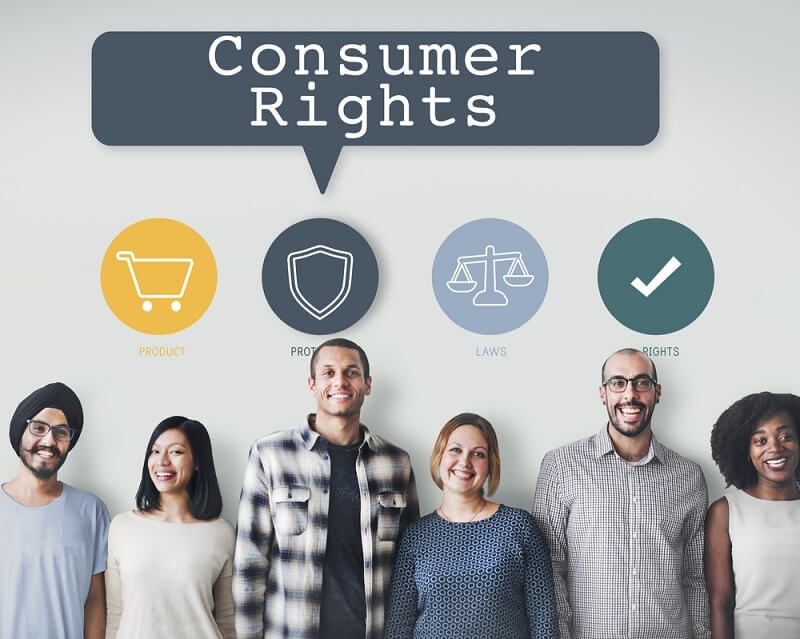
Every day, individuals purchase goods, enter into agreements through contracts, and obtain service delivery without considering whether their consumer rights are being exercised to protect them. In any shopping experience, a grocery store, gym membership, or box store buying a new phone (for example), when you know and understand your consumer rights, you can take safer and more competent chances on obtaining your goods and services and not be threatened to take more than your share of the 'consumption cake.'
Unfortunately, many consumers do not fully take advantage of their consumer protections, and some do not even know their rights exist. Not knowing the law can leave you vulnerable to being misled, overcharged, and/or abused by businesses. Consumer protection laws exist to promote good business practices and support fairness, safety, and transparency.
This article will present a simple guide to consumer rights that every consumer should know. When you finish reading the article, you will understand fundamental consumer rights, how they apply to consumers in everyday examples, and what actions to take if your rights have been breached.
Before discussing the particulars, we should consider why consumer rights are valuable.
Not every seller acts fairly. Some may charge too much for their items, cover up contract terms, or even mislead consumers. Consumer rights are intended to abolish unfair practices.
Unsafe and defective products can cause injuries. Laws have been passed to ensure companies produce safe products and are accountable for product defects.
Strong rights for buyers let the market flourish, so competitors must provide fair competition to win your business.
When consumers know their rights, they can make better choices and avoid wasting money or being misled.
While specifics vary by country, most consumer protection systems encompass these eight fundamental consumer rights.
Consumers are free from products that will put them at unreasonable risk of harm. Potential dangers of damage could include anything from a malfunctioning electronic device to contaminated food or an unsafe vehicle.
Example: If a kitchen appliance has a design defect likely to result in fire, the manufacturer must recall the item or provide a replacement.
Consumers have a right to clear information about what they are buying. You have a right to clear labeling, accurate representation, and pricing.
Example: A food label must contain all ingredients, best-before dates, and nutrition information.
Every consumer should have an avenue to various goods and services at competing prices without being subjected to unfair monopolies.
Example: A company cannot require the purchase of an extended warranty to be able to purchase the product.
Consumers also have the right to express complaints, with a reasonable expectation that someone (either a business or a responsible party) will listen and respond appropriately.
Example: You can submit a review and/or complain to a consumer protection agency or a company.
If you are unsatisfied with the product or service you received from them because of their misconduct or unfair practices, you have a right to a refund, repair, or replacement.
Example: Returning a broken smartphone during the warranty period.
Every consumer has the right to learn how to use products safely, avoid scams, and understand their consumer rights.
Example: A public education campaign on identifying counterfeit products, scams, etc.
Consumers have the right to live and work in a safe and healthy environment, obliging businesses to use sustainable means.
Example: Having regulations preventing factories from contaminating neighborhoods.
Access to food, clean drinking water, clothing, shelter, and medical care is a significant consumer right.
Consumer protection laws ensure that products meet safety standards and are labeled correctly when shopping for food. Spoiled or mislabeled food can be reported.
With e-commerce booming, buyer rights extend to online purchases. This includes clear return policies, delivery guarantees, and protection from online fraud.
Contracts must clearly state terms and conditions, whether for a gym membership or an internet subscription. Hidden fees or misleading terms violate consumer rights.
Patients are also consumers. They can provide information about treatments, medication safety, and transparent billing.
Banking and credit services fall under consumer protection as well. You should be informed about interest rates, fees, and repayment obligations.

Protection laws for consumers differ from country to country, but they usually have four critical areas of focus:
These laws protect the marketplace and create trust in the market, which also helps honest businesses thrive.
Knowing your consumer rights is one thing, but understanding how to apply them is another. Here are some simple ways to increase your legal awareness:
Please let me know if the product or service is faulty, misleading, or unsafe.
In most instances, the issue can be resolved directly with the business through its customer service department.
If the business doesn't help, please get in touch with a consumer protection agency or legal body.
The remedy can take various forms. Depending on the issue, it may be a refund, a replacement, or compensation.
Please feel free to leave a review or tell others about your experience. Building awareness will help other consumers avoid similar situations.
Numerous fraudulent domains and phishing frauds exist, taking advantage of consumers who do not know their rights regarding refunds and fraud protection, because it is often easy to lose money.
Many services make it difficult to cancel your subscription, which may feel frustrating and hopeless. As a consumer, you are entitled to know the cancellation terms, which must be understandable and accessible.
Counterfeit goods, including electronics and clothing, are a serious problem. Consumer protection laws allow you to trace sellers of counterfeit goods and provide remedies for consumer harm.
Regarding consumer rights today, protecting personal data is a significant consumer right. Companies must disclose how their data is used.
These inexpensive hacks and hacks like this on other products and services can make you a more powerful consumer!
While consumer protection laws are powerful, they work best when individuals actively defend their rights. Awareness, asking questions, and making informed choices help promote fairness for yourself and the entire community.
Realizing your rights as a consumer isn't merely about knowing how to get refunds or replacements; it is about protecting yourself from being exploited, making informed decisions, and holding businesses and enterprises accountable.
This straightforward guide to consumer rights, which everyone should be aware of, discusses the significance of legal rights, the legal framework of fundamental consumer rights, and practical ways to apply them to everyday life.
We reinforce our standing as buyers and contribute to a fairer marketplace when informed and proactive.
This content was created by AI